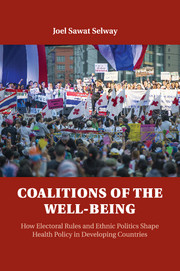1714 results in South-East Asian government, politics and policy
Contents
-
- Book:
- Governing Taiwan and Tibet
- Published by:
- Edinburgh University Press
- Published online:
- 25 October 2017
- Print publication:
- 08 July 2015, pp iii-iii
-
- Chapter
- Export citation
Frontmatter
-
- Book:
- Governing Taiwan and Tibet
- Published by:
- Edinburgh University Press
- Published online:
- 25 October 2017
- Print publication:
- 08 July 2015, pp i-ii
-
- Chapter
- Export citation
References
-
- Book:
- Governing Taiwan and Tibet
- Published by:
- Edinburgh University Press
- Published online:
- 25 October 2017
- Print publication:
- 08 July 2015, pp 231-252
-
- Chapter
- Export citation
miscellaneous Frontmatter
-
- Book:
- Governing Taiwan and Tibet
- Published by:
- Edinburgh University Press
- Published online:
- 25 October 2017
- Print publication:
- 08 July 2015, pp iv-vi
-
- Chapter
- Export citation
2 - The Real Utopian Approach
- from Part 1 - Theoretical Approaches
-
- Book:
- Governing Taiwan and Tibet
- Published by:
- Edinburgh University Press
- Published online:
- 25 October 2017
- Print publication:
- 08 July 2015, pp 37-53
-
- Chapter
- Export citation
5 - Referendum and the Taiwanese National Identity
- from Part 2 - On Taiwan
-
- Book:
- Governing Taiwan and Tibet
- Published by:
- Edinburgh University Press
- Published online:
- 25 October 2017
- Print publication:
- 08 July 2015, pp 96-107
-
- Chapter
- Export citation
6 - Sovereignty and the Taiwan Question
- from Part 2 - On Taiwan
-
- Book:
- Governing Taiwan and Tibet
- Published by:
- Edinburgh University Press
- Published online:
- 25 October 2017
- Print publication:
- 08 July 2015, pp 108-126
-
- Chapter
- Export citation
Part 2 - On Taiwan
-
- Book:
- Governing Taiwan and Tibet
- Published by:
- Edinburgh University Press
- Published online:
- 25 October 2017
- Print publication:
- 08 July 2015, pp 73-74
-
- Chapter
- Export citation
1 - The Idea of Democratic Governance
- from Part 1 - Theoretical Approaches
-
- Book:
- Governing Taiwan and Tibet
- Published by:
- Edinburgh University Press
- Published online:
- 25 October 2017
- Print publication:
- 08 July 2015, pp 13-36
-
- Chapter
- Export citation
Acknowledgements
-
- Book:
- Governing Taiwan and Tibet
- Published by:
- Edinburgh University Press
- Published online:
- 25 October 2017
- Print publication:
- 08 July 2015, pp vii-viii
-
- Chapter
- Export citation
7 - Confucian and Marxist Theoretical Traditions of Minority Rights and Beyond
- from Part 3 - On Tibet
-
- Book:
- Governing Taiwan and Tibet
- Published by:
- Edinburgh University Press
- Published online:
- 25 October 2017
- Print publication:
- 08 July 2015, pp 129-144
-
- Chapter
- Export citation
3 - The Empire Thesis and its Critics
- from Part 1 - Theoretical Approaches
-
- Book:
- Governing Taiwan and Tibet
- Published by:
- Edinburgh University Press
- Published online:
- 25 October 2017
- Print publication:
- 08 July 2015, pp 54-72
-
- Chapter
- Export citation
Introduction
-
- Book:
- Governing Taiwan and Tibet
- Published by:
- Edinburgh University Press
- Published online:
- 25 October 2017
- Print publication:
- 08 July 2015, pp 1-10
-
- Chapter
- Export citation
Part 1 - Theoretical Approaches
-
- Book:
- Governing Taiwan and Tibet
- Published by:
- Edinburgh University Press
- Published online:
- 25 October 2017
- Print publication:
- 08 July 2015, pp 11-12
-
- Chapter
- Export citation
9 - Beyond Chinese Linguistic Imperialism: Multi-linguistic Policy
- from Part 3 - On Tibet
-
- Book:
- Governing Taiwan and Tibet
- Published by:
- Edinburgh University Press
- Published online:
- 25 October 2017
- Print publication:
- 08 July 2015, pp 172-190
-
- Chapter
- Export citation
Index
-
- Book:
- Governing Taiwan and Tibet
- Published by:
- Edinburgh University Press
- Published online:
- 25 October 2017
- Print publication:
- 08 July 2015, pp 253-263
-
- Chapter
- Export citation
8 - Beyond Socialist Autonomy in Tibet
- from Part 3 - On Tibet
-
- Book:
- Governing Taiwan and Tibet
- Published by:
- Edinburgh University Press
- Published online:
- 25 October 2017
- Print publication:
- 08 July 2015, pp 145-171
-
- Chapter
- Export citation
4 - Nationalism, Democratisation and the Taiwan Question
- from Part 2 - On Taiwan
-
- Book:
- Governing Taiwan and Tibet
- Published by:
- Edinburgh University Press
- Published online:
- 25 October 2017
- Print publication:
- 08 July 2015, pp 75-95
-
- Chapter
- Export citation
Part 3 - On Tibet
-
- Book:
- Governing Taiwan and Tibet
- Published by:
- Edinburgh University Press
- Published online:
- 25 October 2017
- Print publication:
- 08 July 2015, pp 127-128
-
- Chapter
- Export citation

Coalitions of the Well-being
- How Electoral Rules and Ethnic Politics Shape Health Policy in Developing Countries
-
- Published online:
- 05 July 2015
- Print publication:
- 26 June 2015

